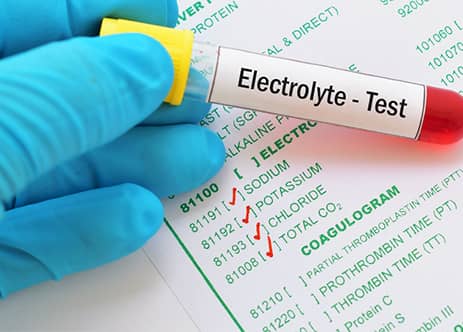Electrolyte Disorders
Electrolyte Disorders
Electrolytes are essential elements and compounds in our body which regulate many vital functions. Commonly known electrolytes are: sodium, potassium, chloride, magnesium, calcium, phosphorus, etc. Electrolyte disorders arise when levels of these electrolytes are either high or low. These disorders range from mild and incidentally detected on lab testing or severe which may present as seizures, delirium or coma.

What do electrolytes do?
Electrolytes perform different functions in your body:
Sodium controls fluid levels and aids nerve and muscle function.
Potassium supports heart, nerve and muscle functions. It also moves nutrients into cells and waste products out of them while supporting your metabolism.
Calcium helps blood vessels contract and expand to stabilize blood pressure. It also secretes hormones and enzymes (proteins) that help the nervous system send messages.
Chloride helps maintain healthy blood levels, blood pressure and body fluids.
Magnesium aids nerve and muscle function. It also promotes the growth of healthy bones and teeth.
Phosphate supports the skeletal system, as well as nerve and muscle function.
Bicarbonate helps balance acids and basic alkaline compounds (bases) in blood (pH balance). Bicarbonate also helps move carbon dioxide (a waste product) through your bloodstream.
